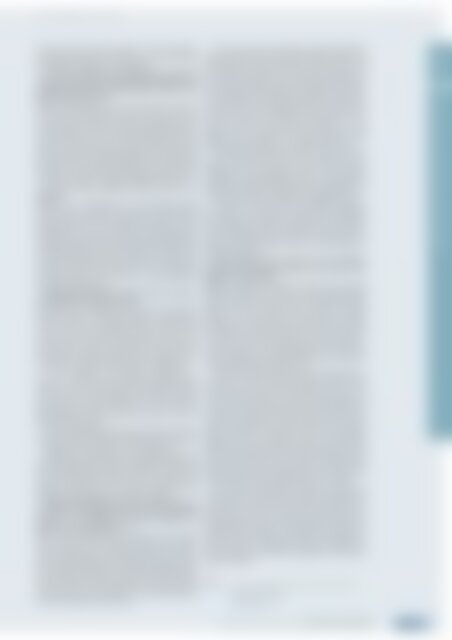atw - International Journal for Nuclear Power | 05.2020
Description Ever since its first issue in 1956, the atw – International Journal for Nuclear Power has been a publisher of specialist articles, background reports, interviews and news about developments and trends from all important sectors of nuclear energy, nuclear technology and the energy industry. Internationally current and competent, the professional journal atw is a valuable source of information. www.nucmag.com
Description
Ever since its first issue in 1956, the atw – International Journal for Nuclear Power has been a publisher of specialist articles, background reports, interviews and news about developments and trends from all important sectors of nuclear energy, nuclear technology and the energy industry. Internationally current and competent, the professional journal atw is a valuable source of information.
www.nucmag.com
Create successful ePaper yourself
Turn your PDF publications into a flip-book with our unique Google optimized e-Paper software.
<strong>atw</strong> Vol. 65 (2020) | Issue 5 ı May<br />
will work closely with the industry to ensure generation<br />
transition and competence transfer, as well as it will help<br />
the work<strong>for</strong>ce adapt to new technologies.<br />
Q: The EU is working on a comprehensive industrial<br />
strategy, which aims to make European industry more<br />
competitive and help sustainable growth. Where is the<br />
place of nuclear in this?<br />
The nuclear industry will strive to prove that we are able<br />
to fit into it by showing what we have to offer and proving<br />
that the nuclear industry is capable of playing its part in<br />
the development of the European economy. The European<br />
nuclear industry has a lot to offer. Maintaining jobs and<br />
growth are among Europe’s priorities and <strong>for</strong> this it will<br />
need to maintain a strong industrial base with a significant<br />
EU-based value. Increased globalisation means Europe’s<br />
industries are facing strong competition from other parts<br />
of the world, which is in part due to higher energy costs.<br />
Q: Do you expect anything specific from the EC<br />
proposal?<br />
Simply to be considered part of low-carbon energy<br />
sources by the commission in its strategy and subsequent<br />
policy proposals would be enough <strong>for</strong> us. What we must<br />
absolutely avoid is to be explicitly excluded from these<br />
developments as was the case <strong>for</strong> the Just Transition Fund.<br />
A leaked version of the EU’s industrial strategy said Europe<br />
needed af<strong>for</strong>dable low-carbon energy <strong>for</strong> its industry and<br />
to maintain competitiveness. This is what we expect to see<br />
nuclear be part of in the proposal. We are not asking <strong>for</strong><br />
any special treatment, but rather <strong>for</strong> a level playing field<br />
<strong>for</strong> all low-carbon sources.<br />
Q: What could the nuclear industry still do to improve<br />
its capabilities and project record?<br />
In 2019, senior representatives from across the nuclear<br />
industry outlined – in their joint manifesto – what needs to<br />
be done to achieve a decarbonised Europe by 2050, whilst<br />
at the same time maintaining growth and jobs. The<br />
industry needs to deliver the required volume of nuclear<br />
capacity on time and at a competitive cost. To achieve that,<br />
the industry is working closely with the supply chain to<br />
maximise the benefits of replicating new build projects.<br />
In the manifesto, the industry underlined the<br />
importance of investing in and maintaining human capital.<br />
There is a need to work closely with national and local<br />
governments and other stakeholders to make the industry<br />
more attractive to young people and to ensure it has the<br />
highly skilled work<strong>for</strong>ce it needs. We need to avoid any<br />
potential work<strong>for</strong>ce gap.<br />
In the context of the future European industrial strategy,<br />
nuclear is capable of providing stable low-carbon electricity<br />
– compared with renewables – at an af<strong>for</strong>dable cost.<br />
Furthermore, many industries are energy intensive and<br />
will need to find solutions which can help them decarbonise<br />
their manufacturing processes. Otherwise, Europe will<br />
run the risk of losing its industries due to so-called “carbon<br />
leakage”. <strong>Nuclear</strong> has a role to play in supporting these<br />
industries and helping them to remain in Europe.<br />
Q: Supply chain problems have been a major headache<br />
<strong>for</strong> nuclear new-build projects in Europe and North<br />
America. Is the industry working to improve the<br />
efficiency of the supply chain?<br />
We are fully supporting the optimisation of the supply<br />
chain. Later this year, Foratom’s Supply Chain Optimisation<br />
Working Group will publish a report that will include<br />
recommendations on what should be done to enable<br />
the continuous development of safety and reliability of the<br />
EU nuclear fleet. We want to work more closely with regulators<br />
to promote the better alignment of licensing and regulatory<br />
processes and contribute to more harmonisation<br />
across the European nuclear sector.<br />
Many of our member organisations comprise themselves<br />
many companies from the European supply chain, both<br />
locally and at an international level. They are all aware of<br />
the challenges and want to work to improve the efficiency of<br />
the sector. For example, some of our Nordic members have<br />
been pushing <strong>for</strong> the development of standard rules to allow<br />
<strong>for</strong> “off the shelf” procurement of com ponents coming from<br />
other industries but with applications in the nuclear sector<br />
as well. Here a close coordination and open discussion with<br />
national regulators and industrial authorities is very<br />
important. It is a complex and very technical matter which<br />
requires careful attention and largely depends on the<br />
individual type of equipment or components in question.<br />
Our supply chain report will be a step in the right<br />
direction. We will put <strong>for</strong>ward several high-level recommendations<br />
and communicate them to the European<br />
Commission and all stakeholders. There are not going to be<br />
quick results overnight. Harmonisation of standards in the<br />
industry is going to be a lengthy, but invaluable process.<br />
Of course, to make sure that our capabilities match the<br />
EU’s targets, we should not <strong>for</strong>get about supporting<br />
innovation and research and development. In this respect,<br />
more funding <strong>for</strong> research into both current and future<br />
nuclear technologies such as SMRs and using nuclear to<br />
produce heat and hydrogen must be made available by<br />
Europe’s leadership<br />
Q: Brexit means the EU will lose one of its biggest<br />
nuclear power operating member states. What is the<br />
impact <strong>for</strong> the industry?<br />
<strong>Nuclear</strong> energy’s perception in Europe varies across<br />
different member states. At EU level we are seeing a fragile<br />
balance of power between countries which support nuclear<br />
energy and those which don’t. Countries including<br />
Bulgaria, the Czech Republic, Finland, France, Romania<br />
and Sweden see nuclear energy as essential to their energy<br />
mix. Others have taken the decision not to have any nuclear<br />
or to phase it out. In more extreme cases, some countries –<br />
Austria in particular – are fighting against the use of nuclear<br />
power in member states other than their own, making use<br />
of all possible legal and political means.<br />
The UK is pro-nuclear and its absence will definitely have<br />
an impact on nuclear energy’s perception in the EU. That<br />
said, in many countries the tide towards nuclear may be<br />
turning. We have countries – without nuclear energy so far<br />
– that are seriously considering investing in new build, such<br />
as Poland and Estonia. Recently, several member states<br />
made their commitment to more ambitious CO 2 reduction<br />
targets conditional on being able to invest in new nuclear<br />
capacity. Also, the European Council’s memorandum<br />
following the latest EUCO includes nuclear energy as a tool<br />
used by some member states to achieve climate neutrality.<br />
This trend shows that more and more EU member states<br />
consider nuclear energy an important tool in counteracting<br />
climate change and see a bright future <strong>for</strong> it in Europe.<br />
The German government’s decision to phase out<br />
nuclear power can be perceived by other EU member states<br />
in some way as a ‘lesson learnt.’ Germany is one of the most<br />
anti-nuclear countries in the EU and its decision to prematurely<br />
phase out its nuclear fleet means it will miss its<br />
2020 emissions targets by a wide margin. If Germany had<br />
decided in 2011 to phase out 20 GW of coal capacity instead<br />
of nuclear, it would have reached its emissions targets<br />
and would now be rightly recognised as the European<br />
climate champion.<br />
Author<br />
NucNet – The Independent Global <strong>Nuclear</strong> News Agency<br />
Avenue des Arts 56 2/C<br />
1000 Bruxelles, Belgium<br />
www.nucnet.org<br />
INSIDE NUCLEAR WITH NUCNET 249<br />
Inside <strong>Nuclear</strong> with NucNet<br />
Foratom Interview: Why Europe Needs to Include <strong>Nuclear</strong> in Low-Carbon Energy Planning

















